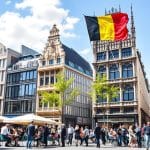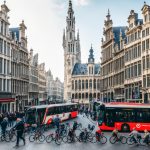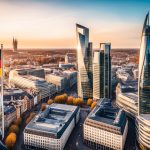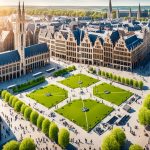Life and Business in Belgium
Living and Working in Belgium – Info and Tips
Planning a move to Belgium? Explore our comprehensive guide for invaluable insights on living and working in Belgium.
Belgium, a small yet culturally rich European country, has become an attractive destination for expatriates from around the world. With its strategic location as the capital of the European Union and NATO, Belgium offers not only a unique cultural experience but also a thriving job market.
In this guide, we’ll delve into essential information and practical tips for those considering living and working in Belgium.
Belgium’s Overview
Belgium, nestled between France, Germany, Luxembourg, and the Netherlands, boasts a captivating blend of cultures and languages. Its rich history, stunning architecture, and diverse landscapes make it a fascinating place to call home. The country is renowned for its waffles, chocolates, and, of course, its world-class beer.
Belgium also holds a vital role in international politics as the headquarters of both the European Union and NATO. This, in turn, contributes to a multicultural environment and a dynamic economy that attracts professionals from various backgrounds.
Belgium’s medieval cities, including Bruges, Ghent, and Antwerp, provide a glimpse into the nation’s rich legacy and historical significance. Its well-preserved architecture, including stunning cathedrals and picturesque canals, adds to the country’s charm. Belgium’s diverse population includes not only native Belgians but also a significant number of expatriates. Approximately 13% of Belgium’s population consists of foreign-born residents, contributing to the nation’s cultural diversity.
Working in Belgium
The work market in Belgium is vibrant and diverse, with opportunities in industries like manufacturing, finance, technology, and healthcare. Brussels, the capital, is a major hub for international organizations and businesses, which attracts expatriates from all around the world.
In Belgium, punctuality is valued highly, and a healthy work-life balance is encouraged. Business etiquette includes a formal approach, with handshakes and proper titles being essential in professional settings.
Expatriates looking to work in Belgium should be aware of the country’s work permits and visa requirements. The specific permits required depend on factors like the applicant’s nationality and the type of work being done. It’s important to do your homework and collect the required paperwork before moving.
For job seekers, Belgium offers numerous platforms and agencies to help those trying to find employment. Websites like LinkedIn, StepStone, and Glassdoor are excellent for looking for your desired job. Networking is also highly beneficial, as many jobs are found through referrals and personal connections.
The country’s gross domestic product (GDP), which is expected to reach $581.4 billion by the end of 2023, is a clear indication of Belgium’s economic strength. The country is home to many multinational corporations, making it an ideal destination for professionals seeking career growth.
In addition to a thriving job market, Belgium also offers competitive salaries. In 2023, the average gross monthly salary in Belgium is around €3,624, which is much more than you need to live comfortably in Belgium for a month.
Living in Belgium
Belgium, while not the most affordable European destination, offers a comfortable and high-quality lifestyle. The cost of living varies depending on the region, with Brussels being the most expensive city. Housing, transportation, and daily necessities contribute to the overall cost.
Education: The education system in Belgium is excellent, with a range of public and private options available. As an expatriate, you can find many schools that cater to various international curriculums.
Healthcare: Belgium takes pride in its healthcare system, providing universal coverage to residents and expatriates. It’s mandatory for all residents to have health insurance, and this is typically arranged through an employer.
Accommodation: When it comes to accommodation, expatriates have choices between renting apartments or houses. Although shorter-term alternatives are available, yearly leases are the most common. It’s essential to thoroughly research the housing market and understand rental laws.
Transportation: Belgium has an efficient public transportation infrastructure that makes traveling within and between cities simple. Trains, subways, and buses are widely available, and a well-maintained road network makes travel by car easier.
Sustainability: The Belgian government places a strong emphasis on environmental sustainability, with the country ranking 21st in the Environmental Performance Index in 2023. This commitment is reflected in efficient public transportation, renewable energy initiatives, and recycling programs.
The food culture of Belgium also reflects the country’s dedication to sustainability, with an increasing focus on organic and locally sourced goods. Farmers’ markets all around the nation provide a variety of fresh and eco-friendly produce.
Belgian Culture and Lifestyle
Belgium’s culture is a delightful mix of influences, primarily resulting from its linguistic divisions. The country is divided into three regions: Flanders (Dutch-speaking), Wallonia (French-speaking), and Brussels (officially bilingual). This linguistic diversity significantly impacts daily life and culture.
Belgium is known for its art, with famous painters like René Magritte and Pieter Bruegel being born and raised on this land. The nation also has a vibrant music industry and a rich culinary heritage. Belgian cuisine offers many delicacies like moules-frites (mussels and fries) and decadent chocolates that people from all around the world come to the country to enjoy.
Belgium’s official languages are French and Dutch, but English is also commonly spoken, especially in larger cities. However, building relationships and interacting with people on a daily basis can be made much easier by learning the local languages, and it also fosters a sense of belongingness.
The Belgian people are known for their friendliness and open-mindedness, so, most expatriates often find it easy to integrate into Belgian society, thanks to the warm welcome they receive.
Legal and Administrative Aspects
Knowing Belgium’s legal and administrative procedures is necessary if you want to live there. All Expatriates are required to register with their local municipality and obtain a residence permit within eight days of arrival. Belgium has a progressive tax system, and understanding its complexities is crucial for expatriates. It’s essential to help you determine your tax status, as well as any tax treaties there may be between Belgium and your home country.
The traffic laws are also strictly enforced there, and fines for violations can be hefty, so you need to be careful. Additionally, Belgium has a comprehensive set of labor laws that protect employees’ rights.
Exploring Belgium’s Natural Beauty
Belgium’s charm extends beyond its cities, as the country is blessed with stunning natural beauty that entices outdoor enthusiasts and nature lovers. It offers a variety of outdoor landscapes, ready for everyone to explore, from lush woods to peaceful coasts.
Ardennes:
The Ardennes region, located in the southern part of Belgium, is a paradise for hikers and those seeking adventure. Its dense forests, rolling hills, and rivers provide endless opportunities for outdoor activities. You can go explore picturesque villages, kayaking in the River Lesse, or hiking in the beautiful High Fens nature reserve.
Belgian Coast:
Belgium’s coastline stretches for about 67 kilometers along the North Sea. During the summer, the coastal communities of Ostend, Knokke-Heist, and Blankenberge provide sandy beaches and a thriving beach culture. It’s a great chance for people to savor fresh seafood in the coastal restaurants.
Ardennes Caves:
The Ardennes is also home to a network of fascinating caves, including the Han-sur-Lesse Caves and the Remouchamps Caves. Explore the underground world with guided tours that reveal stunning limestone formations and underground rivers.
Hallerbos:
Every spring, the Hallerbos forest transforms into a fairy tale landscape with its famous bluebell carpet. Visitors can enjoy enchanting walks amidst the blooming bluebells, creating a surreal and picturesque experience.
Belgium’s commitment to environmental sustainability extends to its natural reserves and parks. These protected areas ensure the preservation of the country’s unique ecosystems and wildlife. Incorporating nature into your Belgian experience can provide a refreshing balance to urban living, making it an ideal destination for those who appreciate the great outdoors.
Tips for Expatriates
As an expatriate, moving into a whole new country can be a relatively scary and overwhelming experience. But, to make the most of your experience living and working in Belgium, consider these tips:
- Learn the Local Languages: While English is widely spoken, mastering Dutch or French can greatly enhance your daily life and job prospects.
- Build a Social Network: Connect with local Belgians and fellow expatriates through social events, clubs, and online communities to create a support system.
- Embrace Local Cuisine: Sample Belgian specialties like waffles, chocolates, and beer. Don’t forget to try regional dishes in Flanders and Wallonia.
- Understand Belgian Bureaucracy: To avoid any legal complexities, you should be familiar with Belgian bureaucracy, including the tax laws and administrative procedures.
- Explore the Country: Belgium’s compact size makes it easy to travel and explore neighboring countries, enhancing your European experience.
- Consider Language Classes: Enroll in language courses to improve your Dutch or French skills, which will go a long way in making your daily life and integration more comfortable.
- Stay Informed: Keep up with local news and events to immerse yourself in Belgian culture and stay aware of any important developments.
- Join Expat Communities: Participate in expat forums and groups to seek advice, share experiences, and find support during your transition.
By following these tips and immersing yourself in Belgian culture, you can definitely enjoy a fulfilling and enriching experience in this charming European nation and greatly improve your quality of life.












